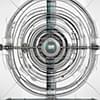Unlike classical computers, which use bits to process information as either 0s or 1s, quantum computers use quantum bits, also known as qubits, which can represent and process both 0 and 1 simultaneously thanks to a quantum property called superposition. This fundamental difference gives quantum computers the potential to solve some complex problems much more efficiently than classical computers.
INL researcher Ernesto Galvão, in collaboration with Sapienza Università di Roma (Rome) and Istituto di Fotonica e Nanotecnologie (Milan), recently published a groundbreaking study in the journal Science Advances (“Polarization-encoded photonic quantum-to-quantum Bernoulli factory based on a quantum dot source”), where they describe a new set-up for a quantum-to-quantum Bernoulli factory.
A Bernoulli factory is a method to manipulate randomness, using as inputs random coin flips with a certain probability distribution, and outputting coin flips with a different, desired distribution.
